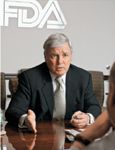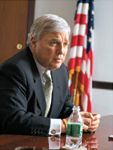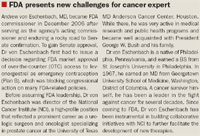- Safety & Recalls
- Regulatory Updates
- Drug Coverage
- COPD
- Cardiovascular
- Obstetrics-Gynecology & Women's Health
- Ophthalmology
- Clinical Pharmacology
- Pediatrics
- Urology
- Pharmacy
- Idiopathic Pulmonary Fibrosis
- Diabetes and Endocrinology
- Allergy, Immunology, and ENT
- Musculoskeletal/Rheumatology
- Respiratory
- Psychiatry and Behavioral Health
- Dermatology
- Oncology
Dr von Eschenbach's vision: FDA's newest commissioner faces multiple challenges
Andrew von Eschenbach, MD, has faced a number of tough issues since he was sworn in as FDA's commissioner in December 2006, not the least of which is drug safety. Fewer new drugs have been coming to market, and pressure continues to mount for FDA to do more with limited resources. Legislation to reauthorize user fees for pharmaceutical and medical device manufacturers has to be approved by Congress by September 30, 2007, or FDA will have to lay off hundreds of staff members. The need for speedy legislative action has focused public attention on agency operations and policies, a trend likely to continue as the nation's healthcare system and prescription drug costs become a central issue in next year's presidential elections.

Key Points

STRESS ON SCIENCE
One of the key topics of debate is whether FDA has the tools and authority necessary to ensure the safety of drugs and medical products, Dr von Eschenbach acknowledged in an interview with Formulary. On this and other issues, Dr von Eschenbach emphasized the importance of relying on science to fully assess the risks and benefits of prescription drugs. "Our ability to understand these products and their impact on the people who are going to use them, and to understand them at the molecular level, helps us to manage both safety and efficacy simultaneously," he said. As a result, Dr von Eschenbach said he predicts that scientists will "be able to more rapidly approve these drugs and do it more reliably with regard to understanding the risk-benefit ratio."

An effective regulatory pathway should enable FDA to determine whether a new protein is appropriate, said Dr von Eschenbach. "As we look at the complexity of these products, we'll need different scientific tools to arrive at whether a product is appropriate and if it is going to get the outcome similar to the outcome that was obtained with the innovator or parent product. I think we can begin to move through this in a systematic way that's consistent with our mission."
LIFECYCLE APPROACH
The need to relate regulatory decisions to science is central to FDA's Critical Path Initiative and to adopting a lifecycle view of drug regulation, according to Dr von Eschenbach. The commissioner said he believes that people cannot look at drug safety as an isolated issue at the end of the drug development and approval process. Drug safety "is something that really begins at the very front end of the process and carries through the whole continuum, whether we're talking about food or drugs or biologics or devices," he said. FDA needs to be engaged "in the full lifecycle of a product," which includes oversight that builds quality in at the front end and continues after a drug goes to market, Dr von Eschenbach said.
This approach requires FDA to become even more actively involved in postmarket oversight. To this end, Dr von Eschenbach pointed to expanding collaborations with Medicare, the Veterans Benefits Administration, and private health plans such as UnitedHealthcare that allow FDA access to databases. According to Dr von Eschenbach, the use of modern information technologies will help provide earlier signals of adverse outcomes and events that are occurring because of safety issues, but more importantly, such use will also help provide earlier signs of unexpected efficacy. Establishing clearer definitions of populations with unique risks for a particular drug or class of drugs will likely help avoid complications and adverse events, he said. These tools provide "tremendous opportunity for us to understand how these drugs can be utilized even better."

INTEGRATED OPERATIONS
Strong collaboration, integration, and communication within the drug regulatory system also are keys to FDA's improvement of its internal processes for effective oversight of drug safety. This involves regular interaction between the staff that approves new drugs and the staff that oversees postmarket safety, Dr von Eschenbach said. "While outsiders may see a disconnect between those who want to approve drugs and those who are responsible for drug safety, we see it as integrated and working effectively." Dr von Eschenbach said he considers the move of the Center for Drug Evaluation and Research (CDER) and other divisions of FDA to a new campus in White Oak, Maryland, as an opportunity for increased collaboration and integration within the drug center and with other FDA offices.
Dr von Eschenbach said that a vigorous debate and analysis process is important for informed decision-making. "We bring the various perspectives and points of view together to debate, discuss, and analyze vigorously and with passion. And then, from that richness, we make an informed decision of what's best. So it's integration within CDER; it's integration of CDER within the larger FDA portfolio, if you will; and then it's the integration of FDA with the other parts and pieces."

Greater cross-fertilization, communication, and integration will promote sound regulatory decisions, Dr von Eschenbach said, recalling from his days as an oncologist how important diverse medical viewpoints are in helping patients with cancer make decisions about their care. " You want to create this environment that I call-not the melting pot, but the stewpot. Then, out of that, you want a discussion with some people from the perspective that this drug is going to damage or affect other tissues [and] other organs. And I want another group of people coming at it from a point of view that this drug is effective and is going to stop that cancer cell or reverse that diabetes or hypertension. And I want all of that churning until we can say, 'Is this a good solution? Is the benefit-risk ratio in the right balance given the problem?'"
Dr von Eschenbach said this type of debate only works when people feel that their opinions are valued and respected, a process he said he believes "requires leadership and sensitivity." And, he said, the process has to be subject to outside scrutiny; for FDA, that primarily involves advisory committees.
Dr von Eschenbach said that he promises to always listen to others' points of view: "I don't promise I'll always do what you tell me, but I promise I will tell you why." When people offer the richness of their experience, he said, they deserve to know that they were heard and to understand why a decision may not necessarily reflect their perspective. Regulatory decisions often have to be made in the context of what is best for the public at large and for all the patients likely to be affected, he explained. Some individuals may not have an alternative treatment and, for some, a particular drug might increase risks. According to Dr von Eschenbach, decisions have to be based on the comparison of the potential benefit to be gained versus the nature of potential adverse events, and whether there are other drugs that could achieve a similar outcome.
Dr von Eschenbach said he anticipates progress in developing drugs that reflect a better understanding of the patient, rather than of a population. "Now we're making decisions based on populations, but ultimately we're going to move toward making decisions based on subsets and ultimately on individuals. If you can identify ahead of time a genetic makeup that defines serious life-threatening adverse outcomes, you will be able to make more liberal decisions." But, he added: "I don't think we're there yet."
COMMUNICATION IS KEY
Such approaches require better communication with the public about benefits and risks to help shape the decisions of patients and healthcare providers. Dr von Eschenbach said he anticipates that electronic forms of communication will enhance these efforts, as seen already in FDA's efforts to improve drug labeling. The agency's electronic labeling format now makes it possible to update label content and to disseminate that information in real time to the point of care. When patients have their prescriptions filled, he explained, they will be able to get an electronic version of the latest and best information that FDA has about that specific drug.
Dr von Eschenbach said he sees FDA providing "a rich and effective resource for the public" through major changes in its website to make it "much more relevant, more interactive, more searchable, more timely, and more effective." The agency also is partnering with other organizations, such as AARP, to distribute FDA educational materials. "I want us to be the source of expert opinion for the public that we serve, so people see the FDA as their champion in protecting and promoting their health," Dr von Eschenbach said.
IMPROVING ADVERTISING
More timely and more accurate drug information also has to carry over to drug marketing, Dr von Eschenbach said, noting that the new user fee program should enable FDA to consult more actively with industry on materials for direct-to-consumer (DTC) advertising. "I think FDA can do even better in making certain that information is provided to patients in ways that are appropriate and understandable. I think that we need to continue to make certain that we're helping patients and healthcare providers make informed and wise choices," he said.
However, Dr von Eschenbach said he is not ready to support a DTC advertising moratorium for newly approved drugs, as proposed by various members of Congress. He noted that DTC advertising can have a positive impact on public health if it increases disease awareness. And, he said, because patient advocacy groups often know about new drugs before they are approved by FDA, a moratorium may not keep the public from gaining information about the agents. The real challenge, according to Dr von Eschenbach, is to ensure that drug marketing material is presented in a way that provides a positive, rather than a negative, impact and that guides patients to appropriate drug use.
MULTIPLERESPONSIBILITIES
Follow-on biologics, drug safety, and personalized medications are just some of the items FDA is responsible for overseeing. "There literally is not a day that goes by where there are not issues in this room of great significance to the American people and of great urgency to the American people. It can vary from one day to the next," Dr von Eschenbach said.
From the outside, these complex operations might look like "a maelstrom, a tremendously bubbling cauldron of things that are happening," he said. "Yet from the inside, what I see is an enormous degree of professionalism, experience, competence, talent, and commitment that manages the agency's portfolio very effectively day in and day out." FDA staff members, Dr von Eschenbach said, are constantly stepping up, responding, and dealing with challenges, which gives him "an enormous amount of confidence and an enormous amount of respect for the capabilities of this agency." Dr von Eschenbach said he sees FDA as "an agency that is just simply dealing with an enormously large and complex set of issues on a day-to-day basis."
FDA's expanding responsibilities raise questions about whether it has sufficient authority and resources to accomplish all of its assigned tasks. Dr von Eschenbach said he is seeking to define how the agency should be engaged in postmarket surveillance and what kinds of resources would be required to support that effort. "Then, if there's the need for additional authority to be able to accomplish that, that has to be addressed as well," he said.
At this point, the commissioner said he doesn't want to say "we can't do this because we don't have the resources" or "we don't have the authority." His preferred position is: "Given that the world has radically changed around us today, given that the products we're looking at are radically different from what we saw yesterday, and given that new challenges are emerging-look at changes in production of food, for example-let's look at that new reality, let's define what FDA needs to meet our mission to protect and promote the public health. And then, with that game plan in place, let's operationalize that."
Dr von Eschenbach said that FDA is engaged in conversations with Congress and is providing technical assistance when requested. "I think this is going to be a journey we're going to walk together."
Employers Face Barriers With Adopting Biosimilars
March 1st 2022Despite the promise of savings billions of dollars in the United States, adoption of biosimilars has been slow. A roundtable discussion among employers highlighted some of the barriers, including formulary design and drug pricing and rebates.
